I hope the feelings that you give me carry over
— Falling Forever
I didn’t start out as a Dua Lipa loyalist. Not in the way people tattoo lyrics on their ankles or debate setlists on Reddit. I liked her, yes. I liked that she was sleek and unfussy, like a friend who never overexplains. But something happened in the lead-up to her tour that made it feel like I was living in a city quietly painted in her colours. A song in a café. Her face is on a tram stop ad. A quote from her Service95 newsletter was shared in a story. Over time, it started to feel like the universe was whispering her name into every algorithm, every street corner, every passing moment. That’s the Baader–Meinhof phenomenon in motion. But I wasn’t just noticing her. I was noticing who I was when her music played.
And it turns out, I liked that version of myself.
Radical Optimism, for me, has always felt less like a genre and more like a mirror. Illusion strikes with precision. It’s the song you play when you’ve finally stopped romanticising potential. It’s not bitter, just brutally clear. That kind of self-awareness, the refusal to perform softness when you’ve outgrown it, is its own kind of healing. Then there’s These Walls, which feels like the emotional residue of staying too long in something that no longer holds you. It's not about heartbreak. It’s about energy. What you give, what’s returned, and when you know it’s time to leave the room. Houdini leans into that tension between desire and detachment, and in doing so, gives you permission to protect your space without apology. It captures the chaos of connection and still lets you ghost the version of yourself that clings. And Electricity, that one doesn’t ask you to process. It tells you to feel. It charges you up when you’re low, reminds you that joy can be immediate and visceral. Together, they form something that doesn’t demand narrative closure. They just ask you to show up for yourself with honesty. That’s the kind of self-love that sticks. The kind that doesn’t need permission.
And maybe that’s what caught me. I’ve spent years obsessing over meaning, dissecting songs that made me spiral, holding artists like personal philosophers. But Dua’s music? It doesn’t pull me into introspection. It pulls me out of it. Back into a version of life where dancing counts as catharsis and joy doesn’t need justification.
The first time I actively listened to Dua was because of The Bold Type. Electricity played over one of the scenes; so effortless, free, exactly the kind of moment soundtracks get right when they mirror something unsaid in your own life. The track stayed with me longer than I expected it to. It followed me into playlists, early morning walks, and afternoons where movement was the only way through. And from there, she slowly began to soundtrack more than moods. She started to soundtrack memory.
I never thought I'd hear my heart beat so loud
— Love Again
There is a particular kind of routine that doesn’t quite feel suffocating, but slowly smooths out the edges of your life. You stop noticing the hours because they repeat themselves. The structure keeps you moving, and so you move. Not out of excitement or inspiration, but because movement itself becomes a survival instinct. You wake up, you work, you tick boxes, you reply to messages, you feel moderately accomplished by the time your head hits the pillow. There is comfort in this kind of repetition. But there’s also a forgetting. A forgetting of what it means to feel fully awake to your own life.
That night, inside the arena, something unfamiliar unfolded. It wasn’t dramatic or life-altering. But it was undeniable.
Also, I watched Dua and Troye Sivan perform “Rush” live. Blink, and it still replays in my head. At one point, she handed someone in the crowd a USB with a remix of “Physical” featuring Troye and told her to leak it. Easily one of the most creative things I’ve seen an artist do on stage.
As the lights dimmed and the first bassline hit, my body responded before my thoughts could. By the time Dua appeared on stage, I had already slipped out of the version of myself that measures experiences while they’re happening. I wasn’t thinking about how happy I felt. I was simply inside the feeling. There were no checklists, no half-formed reminders humming in the background. Just sound, movement, and a strange, almost childlike clarity that I hadn’t accessed in months.
This kind of embodied presence, where thought and action align without delay, is often described in Mihaly Csikszentmihalyi’s theory of flow, a state where self-consciousness falls away and time becomes elastic. It’s not performance. It’s total absorption. And that night, I wasn’t trying to feel anything. I just was.
I sang every lyric, sometimes without realising I knew them. I jumped, even when no one around me did. I laughed mid-song because I caught myself smiling too hard. There was no filter, no internal monologue, no distance between what I felt and how I expressed it. And perhaps that’s what startled me most. Not that I was enjoying myself, but that I didn’t feel the need to make sense of the joy while I was in it.
The concert didn’t ask me to reflect. It didn’t ask me to grow. It simply offered a break from the endless self-editing. It allowed me, for two brief hours, to exist outside the loop. Not to escape it, but to look at it from a distance and ask whether the version of me it sustains is the version I want to keep becoming.
When it ended, I didn’t feel euphoric. I felt clear. Not in the way that clarity is often packaged, in quotes or resolutions, but in the way your body feels after a long exhale. The loop resumed the next morning. The emails still arrived, and the list still grew. But something in me had shifted. I began to pay more attention to when I felt most like myself. Not the most productive, or impressive, or even insightful. Just the most present.
That night didn’t change everything. But it reminded me that change doesn’t always begin with a decision. Sometimes it begins with a song you weren’t expecting to dance to, and a version of yourself you forgot was waiting to be remembered.
I want a mind that meets me equally
— Anything for Love
Service95 arrived on a Friday. Another newsletter in a crowded inbox. I didn’t expect much, perhaps a branded note from a celebrity, a moodboard of recommendations, some links. But when I opened Service95, I found something far more deliberate. It didn’t scan like promotional content. The writing was textured. The editorial voice was aware. And the selection of pieces felt like they had been chosen by someone who actually reads. Someone who values time spent with words, not just time spent being seen around them.
As someone who has always gravitated toward long-form journalism, essays that spiral, reflect, take detours, and return changed, Service95 felt like something I hadn’t realised I’d been searching for. It doesn’t overwhelm with volume. It doesn’t pretend to break news. Instead, it offers clarity through context, depth through globality, and warmth through a kind of human-scale intimacy.
What resonated most was not just the emotional cadence of the stories, but the structure of them. How the platform holds space for underrepresented voices, for activist narratives, for travel stories that feel lived-in rather than googled. Dua’s own contributions, her opening letters and city-based favourites, read like journal entries from someone curious, someone paying attention. The restaurants she visits, the people she highlights, the cities she wanders through, they’re not there to posture or perform. They’re there because they moved her. And that sincerity shapes the experience of reading each edition.
In one of her interviews, Dua said, “How else can we expect change for the better, if not by paying attention to the changemakers advocating for just that?” That line stayed with me. It reflects the deeper undercurrent of Service95, the idea that cultural curiosity isn’t ornamental. It’s essential. Her selections are informed by a worldview that is surprisingly and refreshingly well-read. Her intellect is what draws me in, not just as an admirer of her music, but as someone who recognises a mind that reads widely, thinks clearly, and values nuance.
What Service95 affirmed for me is that there’s room to love language and culture, and aesthetics without having to flatten them into content. I’ve often felt split between liking things that are seen as “light,” like fashion, pop, travel, and things considered “serious,” like politics, critique, and long-form writing. This newsletter doesn’t make that distinction. It allows them to co-exist. To inform each other. To be held in the same paragraph without contradiction.
This kind of media experience aligns with sociologist Pierre Bourdieu’s idea of cultural capital. The value isn’t in prestige or surface consumption, but in how taste and curiosity are cultivated through exposure, conversation, and reflection. Service95 does not perform cultural literacy. It builds it.
Dua’s presence in this space is never overstated. Her letters aren’t brand statements. They’re bookmarks. She doesn’t pose as an expert. She positions herself as a fellow reader. A woman thinking, learning, asking, and curating her experience into something shareable.
That level of care matters to me. It’s rare to come across a platform that doesn’t ask for your reaction, but your attention. One that doesn’t pull you in to perform an opinion, but invites you to sit with someone else’s story for just a little longer than usual. For someone like me, whose sense of self has always been closely tethered to thought, reading, and creative observation, that offering is more than generous. It’s sustaining.
Makes me an optimist, I guess
— End of an Era
There are ideas that feel familiar before they are ever articulated. Radical optimism was one of them. The phrase lingered in my mind long before I knew what it would come to mean for me. It didn’t arrive through a self-help book or a manifesto. It appeared through sound, through language, through a series of choices, both hers and mine.
Dua Lipa has spoken about ‘radical optimism’ as a way of being present with difficulty while continuing to believe in the possibility of ease. She does not reduce experience to inspiration. Her understanding of resilience leaves room for detachment, messiness, discomfort, and moments that lack resolution.
Each track on the album moves with a different kind of emotional intelligence. Training Season pulses with exhaustion and high standards. Illusion questions manipulation without melodrama. These Walls captures that internal moment when something has ended long before the words catch up. These songs are honest, but it isn’t the stripped-back confessional kind. It is refined, worked through, and considered. Every word feels earned.
I have always gravitated towards music that makes me excavate things. Memories, meanings, missed moments. But this was different. These songs didn’t require interpretation. They gave me something to feel in real time.
The sociologist Arlie Russell Hochschild once described emotional labor as the work we do to align our feelings with what is expected of us. Radical optimism, in contrast, felt like an internal refusal to perform resilience. It asked nothing of me. It simply reminded me of the person I already was underneath the habit of self-surveillance.
This isn’t about self-transformation. It’s about permission. Permission to enjoy something without apologising for how much it matters. Permission to let your life hold light without waiting for it to become symbolic.
And what remains now, after the concert and after the writing, is an awareness that doesn’t feel dramatic or new. It feels settled. I still move through the structure. I still think more than I sometimes want to. But I also know what it feels like to let that fall away. I know what it means to feel aligned. Not because I planned for it, but because I made space when it arrived.
This is what radical optimism has come to mean for me. Not a concept to adopt. A state I recognised in my own language once someone else gave it shape.
I find myself oddly giddy about tracing the footsteps Dua Lipa left behind in Melbourne. The idea of stepping into the same record stores, browsing vinyl sleeves she might have touched, or sitting at the deli where she paused for coffee or conversation feels less like a fan pursuit and more like an alignment of sensibilities. Those spaces, tactile, grounded, quietly expressive, are entirely my tempo. There’s a certain intimacy to visiting places that someone you admire has frequented, not for the sake of proximity, but to see if the world sharpens a little differently through those windows. If taste is a reflection of worldview, then hers resonates with mine in a way that feels personal without ever being performative.
And maybe, walking into those places, I’m not just following her lead, but meeting myself somewhere familiar.





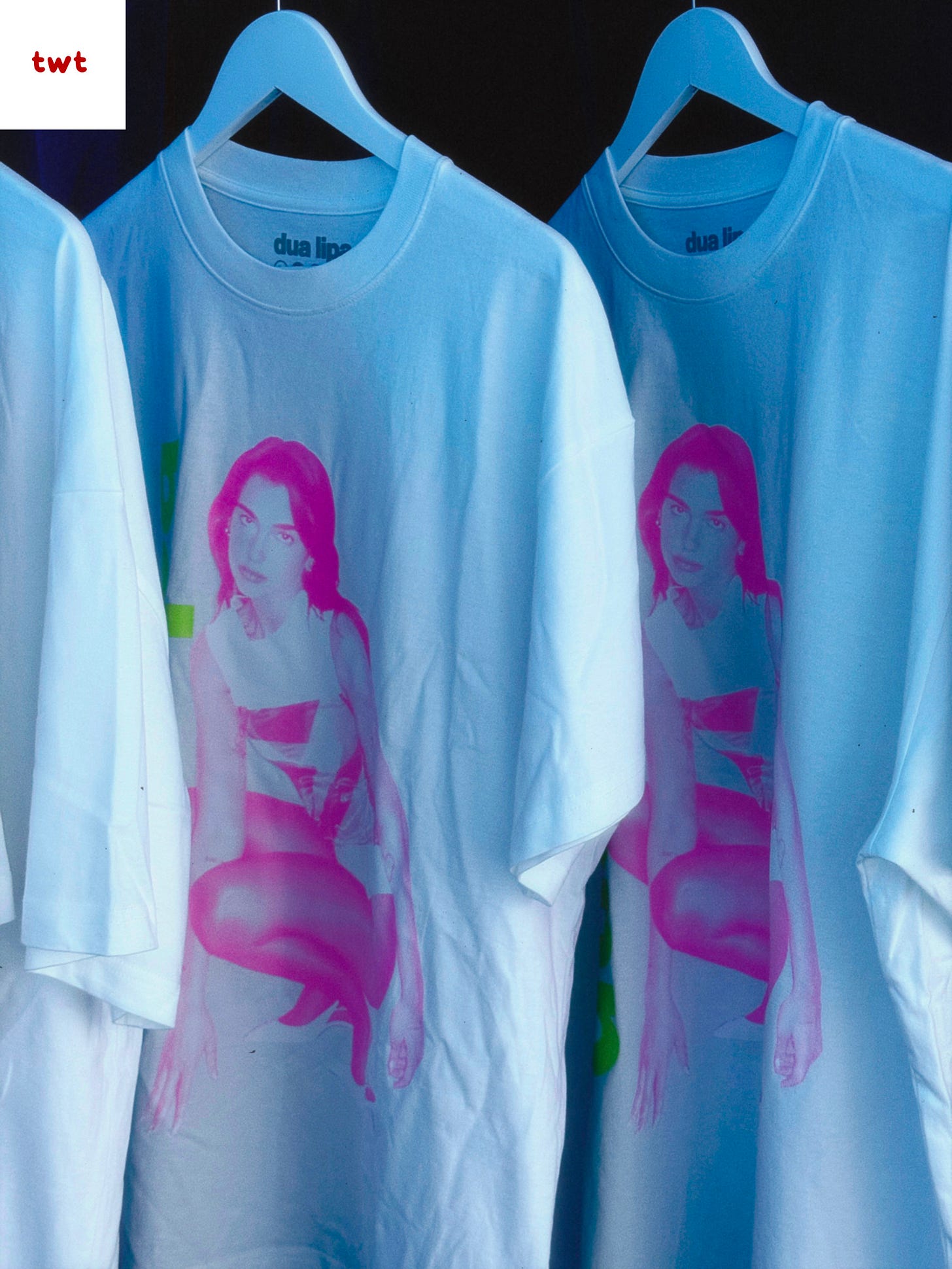
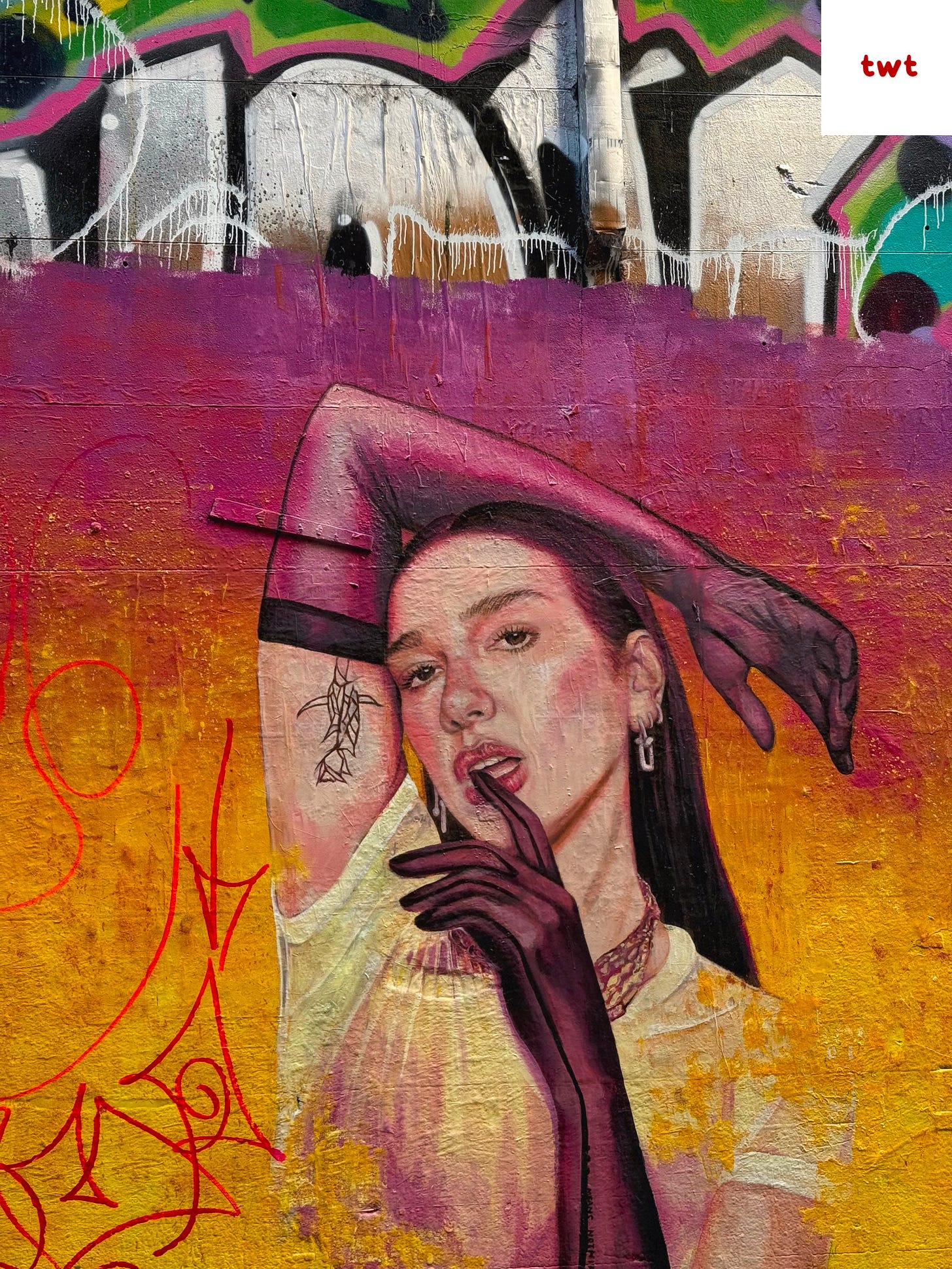
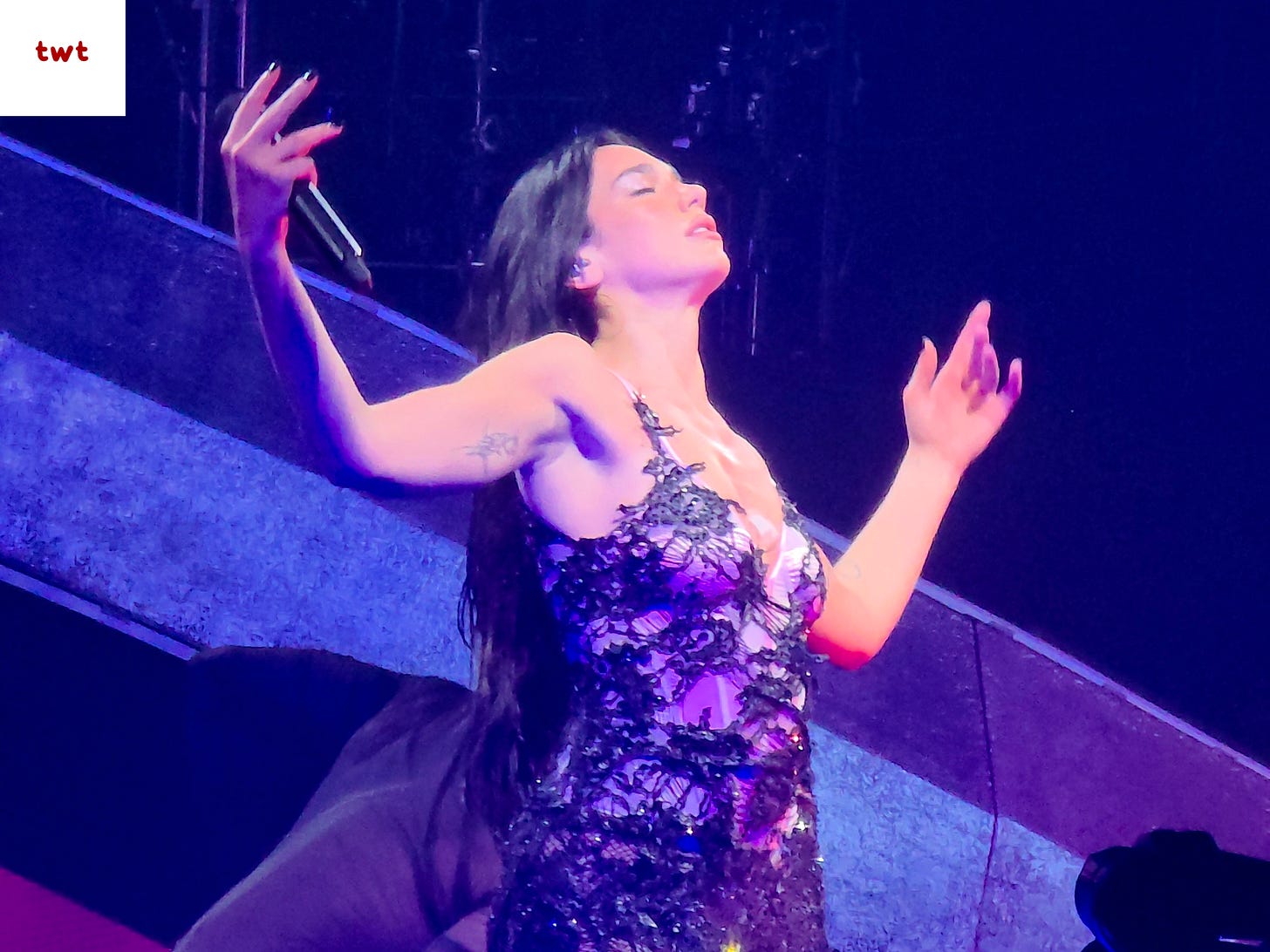

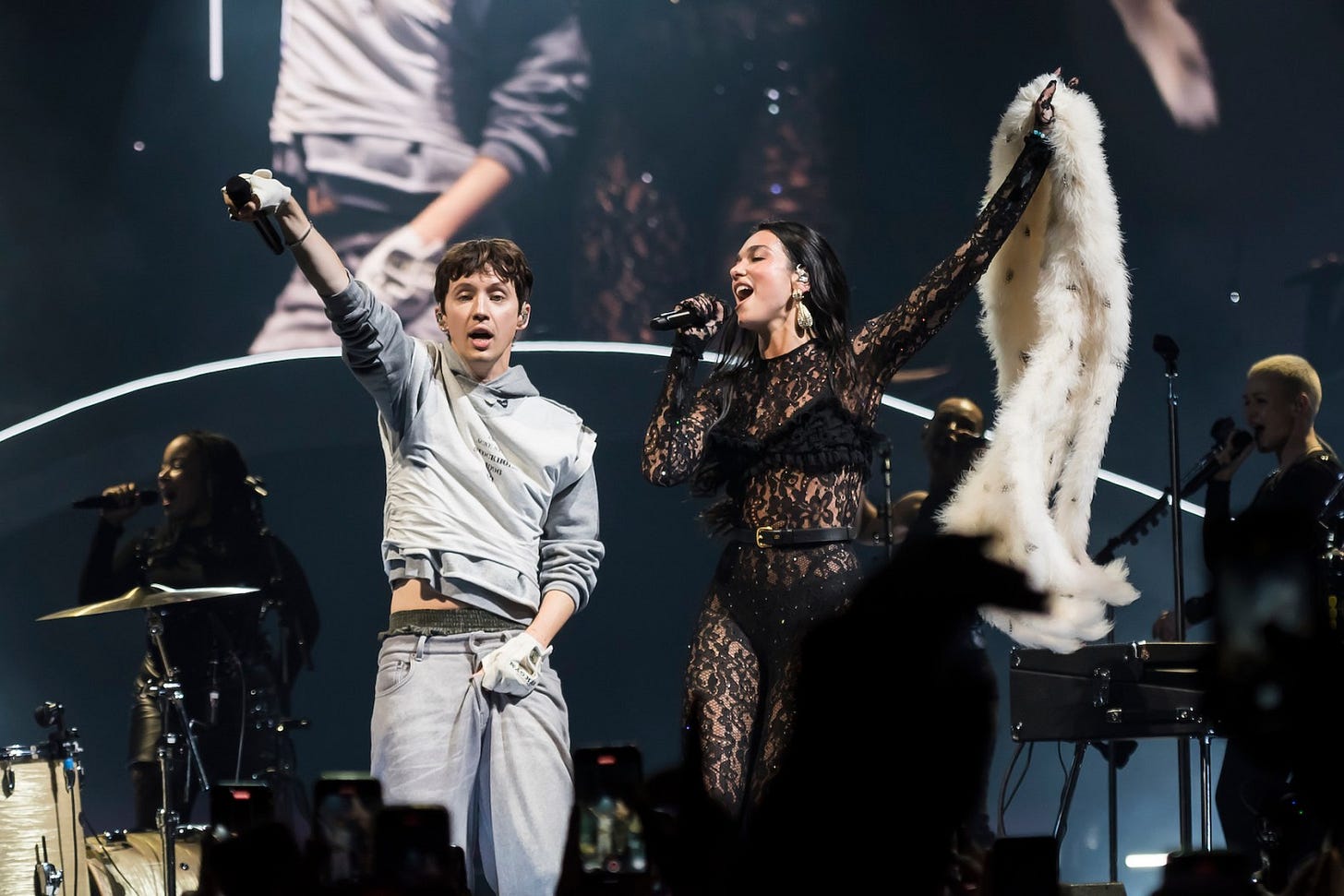



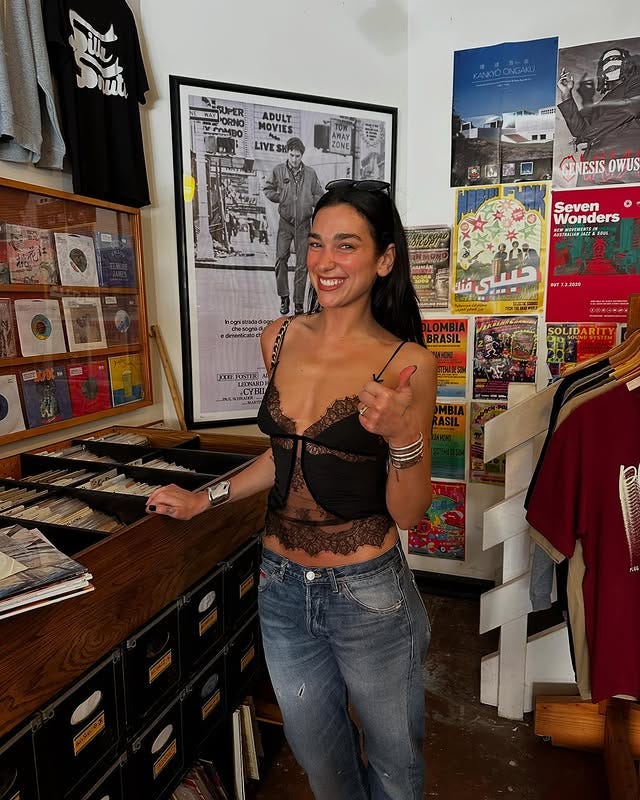

We are all just characters played inside Dua's world 🥰⚡🫠🫡